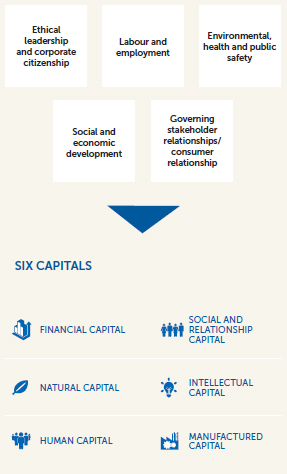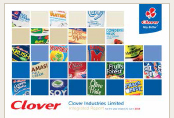REPORT ON THE SIX CAPITALS AND THE
SOCIAL AND ETHICS COMMITTEE REPORT
| COMPANIES ACT: REGULATION 43 |
PERFORMANCE OUTCOMES OF THE SIX CAPITALS |
KING IV™ PRINCIPLES |
|||||
| Good corporate citizenship |
|
1 | Ethical leadership | ||||
| Labour and employment | 2 | Organisational ethics | |||||
| Social and economic development | 3 | Responsible corporate citizenship | |||||
| Consumer relationship | 4 | Strategy and performance | |||||
| Environmental, health and public safety | 5 | Reporting | |||||
| 6 | Role and responsibilities of the governing body | ||||||
| *Dealt with in the report on governance risk and compliance |
7 | Composition of the governing body | |||||
| 8 | Committees of the governing body | ||||||
| 9 | Evaluations of the performance of the governing body |
||||||
| 10 | Appointment and delegation to management | ||||||
| 11 | Risk governance | ||||||
| 12 | Technology and information governance | ||||||
| 13 | Compliance governance | ||||||
| 14 | Remuneration governance | ||||||
| 15 | Assurance | ||||||
| 16 | Stakeholders | ||||||
| 17 | Responsibility of institutional shareholders |
This report is structured in accordance with the concept of the six capitals as defined by the International Integrated Reporting Council (IIRC) which takes into consideration the material inputs or resources required to create and preserve value.
OVERVIEW
Clover’s vision and mission has been aligned to the value chain as we consider strategy, risk, governance, performance and sustainability to be inseparable. This report is structured to incorporate the requirements of the Companies Act, 71 of 2008 (Regulation 43) and King IV™. Clover also utilises the Integrated Reporting Framework (<IR> framework) as issued by IIRC in December 2013.
The <IR> framework provides a principle-based approach through which Clover describes how the key components of the value chain (or business model) are applied to create and sustain value for our stakeholders.
SCOPE AND BOUNDARY
The scope of this report covers Clover’s South African operations and will in time be extended to our subsidiaries in other countries. This report focuses on the most relevant and material issues that could impact significantly on Clover’s ability to create and sustain value for its stakeholders in the long term.
Clover is one of a few South African businesses that has thrived for well over 100 years. We recognise that to survive and prosper, we need to ensure that Clover’s operations and planning is geared towards long-term sustainability. Clover’s Social and Ethics Committee is chaired by an independent director and includes a further two independent directors and one executive director. Details of the committee membership, meetings held and attendance in this financial year are set out here.
The Social and Ethics Committee has considered the matters of the integrated report that are pertinent to Clover.
The responsibilities and functioning of the Social and Ethics Committee are governed by formal terms of reference approved by the board and is subject to regular review. The main objective of the committee is to assist the board in ensuring that Clover remains a responsible corporate citizen that utilises sustainable business practices. The committee monitors, develops, reviews and enhances Clover’s social, ethical, environmental and governance impact. To fulfil its responsibilities, the Social and Ethics Committee adopted a formal workplan that accords with its functions as set out in Regulation 43 of the Companies Act and King IV™. This workplan is designed to enable Clover to fully discharge its statutory functions. The board supports the committee by setting the appropriate tone and Clover’s “Way Better” philosophy across the organisation contributes to Clover’s ethical culture. This report describes the work and conclusions of the committee in its seventh year of establishment. Over and above the requirements of the Act, this report’s scope includes guidelines from the <IR> framework and the sustainability reporting guidelines (G4 version) of the Global Reporting Initiative (GRI). In short, the aspects of Clover’s business most critical to its long-term value creation are summarised in terms of the six capitals principle.
Every year, Clover redefines its risk bearing capacity and risk appetite, and utilises these as the basis for setting materiality levels. Following that exercise, these materiality levels are used to adjust the thresholds of Clover’s delegation of authority, so that appropriate levels of managerial approval are set. These same materiality levels are used in Clover’s Enterprise Wide Risk Management Framework, which ultimately ensures that all material risks are reported to the board committees and considered for inclusion in Clover’s integrated report.
In line with the <IR> framework, Clover only reported on issues it believes to be sufficiently material for inclusion in this integrated report. Less significant matters are reported on the website and elsewhere.
KEY FOCUS AREAS
The following are the key and significant issues considered by the committee during the year under review:
- Review of the Company’s compliance with all legislation, other legal requirements or prevailing codes of best practise;
- Review of the Company’s standing in terms of the goals and purposes of the 10 principles set out in the United Nations Global Compact Principles;
- Review of Company’s standing in terms of the goals and purposes of the OECD recommendations regarding corruption;
- Review of the Company’s standing in terms of the goals and purposes of the Employment Equity Act;
- Review of the Company’s standing in terms of the goals and purposes of the Broad-Based Black Economic Empowerment Act;
- Monitored the Company’s activities with regard to matters relating to the promotion of equality, prevention of unfair discrimination and the reduction of corruption;
- Monitored the Company’s activities with regard to matters relating to the Company’s contribution to development of the communities in which its activities are predominantly conducted or within which its products or services are predominantly marketed;
- Monitored the Company’s activities with regard to matters relating to sponsorships, donations and charitable giving;
- Monitored the Company’s activities with regard to matters relating the environment, health and public safety, including the impact of the Company’s activities and of its products or services. Ensure that all health and safety procedures are uniformly, as far as possible, implemented throughout the organisation;
- Monitored the Company’s activities with regard to matters relating consumer relationships, including the Company’s advertising, public relations and compliance with consumer laws;
- Reviewed the annual sustainability review for publication in the integrated report;
- Reviewed Company’s code of ethics;
- Reviewed the committee’s terms of reference;
- Review the report on the Company’s ethics hotline;
- Monitored the Company’s activities regarding government policies and other legislation that impact on food security; and
- Reviewed the report on excessive overtime and garnishee orders in the Company.





 CFO’s report
CFO’s report
